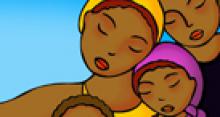Mother of Mothers

The January 10, 2010 earthquake that struck Port-au-Prince marked the worst in that part of the world in more than 200 years. The Haitian government placed the official death toll at 316,000 with a cost to the country’s economy of somewhere between $8 and $14 billion, according to a study by the Inter-American Development Bank. According to the International Organization for Migration, more than 630,000 Haitians were displaced. Nine months after the earthquake, an outbreak of cholera added to Haiti’s woes. A United Nations report released in May stated that more than 300,000 Haitians had been sickened by cholera, and that more than 5,000 had died.
Despite the unimaginable death and destruction, there is a resilient people living and working, rebuilding Haiti. Mother of Mothers is a tribute to the strength and willpower of the mothers of Haiti, a celebration of the tremendous personal courage of mothers rising from victimization to find possibilities that are timeless and selfless. From personal tragedy, they find inspiration as mothers to live lives of service and sacrifice for their families and children. As mothers, they forge the bridge between past and present like bold links in a chain carrying forth a sense of reverence and deep grace.
The mothers are carrying Haiti.
Poem Transcript
When a brave woman's out walking
she's Mistress Life's spitting image
(Michel-Ange Hyppolite)
The faces of mothers of mothers,
their cheekbones gleaming against
taut skins; their eyes glazed
with the scarring of so much loss.
In Haiti, the mothers
of mothers have lamented for so
long—all that is left is the
sturdy presence of grace,
the wide open heart of knowing
how much a casket weighs, how
it feels on the open palm.
The mothers of mothers
march through the congregation
while the children of men
clap their hands, beat
tambourines, scratch the grater
and sing the flat harmony
that shivers the air.
Beneath a cascade of flame yellow
and red flamboyants,
she stalks the outskirts of the
feet worn worship ground—
the outer limits of the congregation
where the weeds and stones
have accumulated, here, where
the excavation of rubble takes
us as far as weary arms
and the creaky wheel barrow
can go.
These women draw a pattern
of circles with their heavy planted
feet, their arms raised high, their
voices continuing with greater
ceremony and occasion;
that conversation that began
with Jesus at four in the morning.
Oh, the mothers of mothers
who know too well the hottest
sorrow—the broken bodies
of children, the boy who covers
a jaw full of maggots, and the
tall lanky son, whose spine
gives under the weight of concrete
before he is pulled out,
laid under the soft blue light
of a wayside clinic, waiting
to go; and quietly, with the flies
returning to his skin, he is
still, though he must wait
there until dusk, before they
notice, before a procession
of mothers leads the body out
into the night, and mother of
mother, she hears her child
wake, look around, and speak:
"How nice the air is out here,"
before he dies, this time for good.
Mothers of mothers,
in your bandana and with your
holy testament, you must
draw the line of defense
around the beleaguered souls,
and speak a torrent of curses
on the beast lurking in the shadows.
Andre Lambertson is a New York based photojournalist and filmmaker who is committed to documentary stories of hope, healing and transformation. He creates award-winning photo essays on social issues for magazines, books, foundations, advocacy organizations, such as Time, US News and World Report, Life, the New York Times Magazine, The Ford Foundation, The George Sorros Foundation, The International Center of Photography, and The Smithsonian Museum. He has been a faculty member for the International Center of Photography’s Photojournalism Department for the past five years. Learn more at www.alambertson.com.
Kwame Dawes is the author of thirteen books of poetry and many books of fiction, non-fiction and drama. His collection, Hope’s Hospice (Peepal Tree), was released in May 2009. He is Distinguished Poet in Residence at the University of South Carolina where he directs the SC Poetry Initiative and the University of South Carolina Arts Institute. Kwame Dawes is the programming director of the Calabash International Literary Festival that takes place each May in Jamaica. Learn more at www.kwamedawes.com.
Related Content
|
Esther, once part of the Maasai tribe in Kenya, shares how one woman empowered her to become an activist and better mother. |
V. Kottavei Williams’ work uses recycled records, boxes, paint, and other materials to depict mothers as powerful, vibrant, and engaged. |
Yvette Mulongo works with women in the Democratic Republic of Congo on issues of family planning and gender based violence, saving women's lives in the process. |
Valerie Mason-John tells the affecting story of a woman in Sierra Leone who lost many of her children and watched her country be torn apart by war and the search for blood diamonds. |


